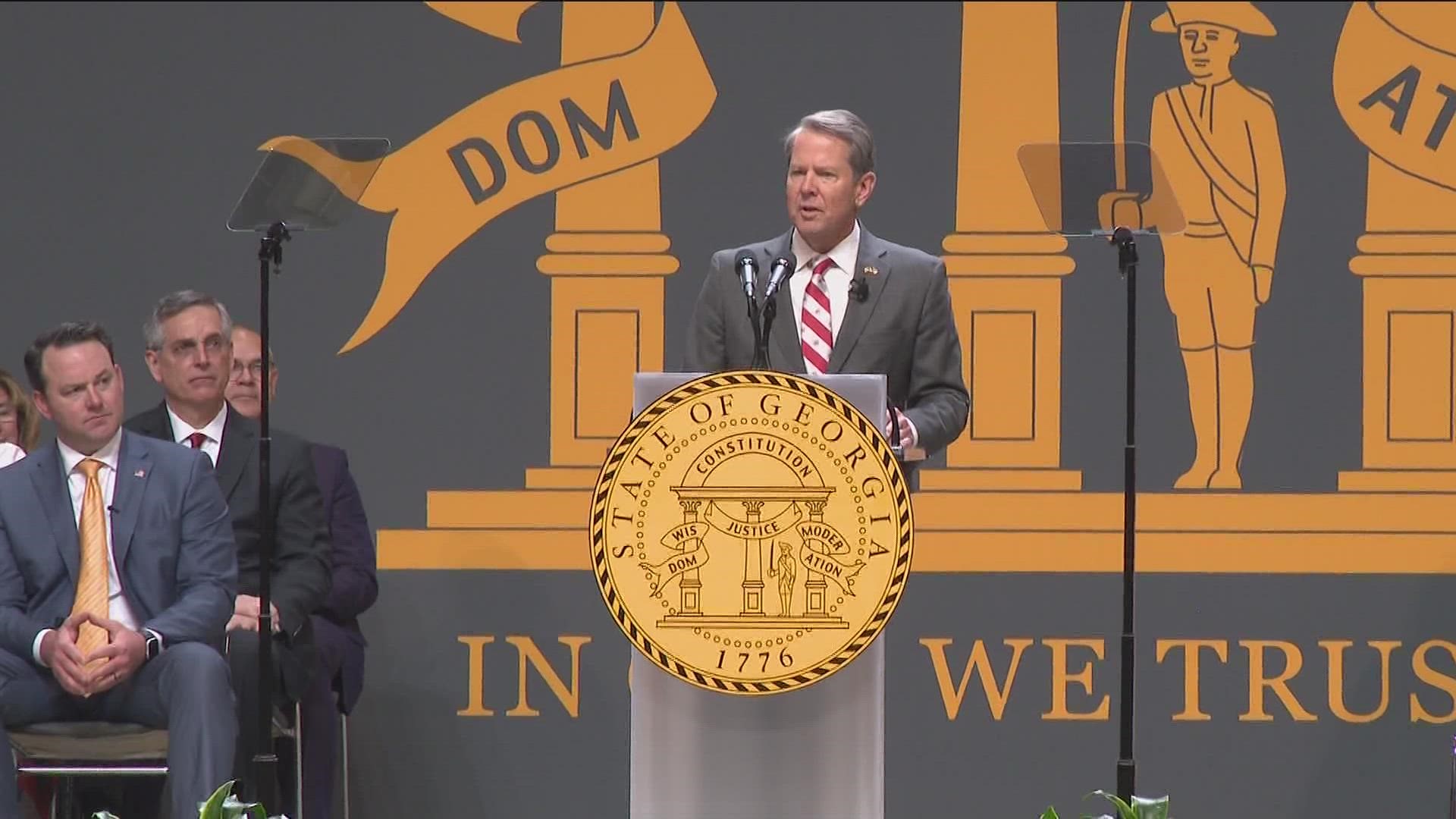ATLANTA — Gov. Brian Kemp on Friday released budget plans that call for more than $1.1 billion in funding for K-12 education, pay raises for state employees and a refund worth at least $250 for every taxpayer in the state.
In his amended budget for the 2023 fiscal year that ends on June 30, Kemp proposed increasing spending by more than $2 billion and maintaining similar levels in the 2024 fiscal year that begins in July. The spending plans top $32 billion.
It’s possible that the Georgia runs another big surplus this budget year. The state ended the 2022 fiscal year with a surplus of roughly $6.6 billion.
“Despite national economic headwinds caused by 40-year high inflation, Georgia’s economy remains a leader nationwide,” Kemp wrote in a letter introducing his proposals. “As we look ahead to the upcoming fiscal year, we expect the state’s economy to be well positioned to withstand any further national economic slowing.”
Boost in education funding
Kemp’s amended 2023 and 2024 budget proposals include an additional $745 million in this fiscal year and more than $1.1 billion in FY 2024 for K-12 education. This includes more than $303 million that would be earmarked for salary increases for teachers and other certified personnel.
They will receive raises of $2,000 next budget year, according to the proposal.
If approved, the state would spend $26.9 million in the next fiscal year on school counselors to address students' mental health and emotional wellbeing.
Kemp has also proposed giving an additional $61.2 million to the state’s HOPE scholarship program in the next budget year to completely cover the cost of tuition at all Georgia public colleges and universities. Full-time students will save an average of $444 each year, Kemp wrote in his proposal.
Tax breaks and pay bonuses
With the state bringing in more money than it expected once again, Kemp is again recommending that $1 billion worth of Georgia’s reserves be used to give taxpayers an additional refund.
Single filers would receive $250 while joint filers could receive up to $500.
The governor also recommended that the state create one-time homeowner property tax relief grants. Homeowners will receive a $20,000 exemption for their assessed home value on their 2023 property tax bill. Under the plan, homeowners would see an average savings of $500.
“These actions will put real money back in the pockets of hardworking Georgians facing unforeseen jumps in property values and record-high inflation,” Kemp wrote.
Teachers wouldn’t be the only ones getting a pay bump under Kemp’s plans. If approved, the state would spend $243 million in FY 2024 to provide state employees with a $2,000 cost-of-living increase.
The economy
In step with major investments made in the electric vehicle sector, Kemp recommended $130 million be spent to develop two new Quick Start electric vehicle training facilities.
The governor also proposed $166.7 million be placed in the Regional Economic Business Assistance (REBA) program. The goal is to attract large economic development projects in all parts of the state, not just the Atlanta metro.
Kemp is also focused on housing as the state economy grows. He recommended that the state develop a Rural Workforce Housing Fund, which would assist developers and housing authorities in getting land ready for new housing developments. The program would receive more than $35 million from OneGeorgia Authority, a state program aimed at economic development in rural areas.
Healthcare
Under the proposed 2024 fiscal year budget, the state would spend $52 million to implement the Georgia Pathways to Coverage program, Kemp’s limited Medicaid expansion.
The program requires that residents complete a minimum of 80 hours of work or volunteering a month to receive Medicaid. The Trump administration greenlit the expansion, but the Biden White House attempted to stop it. A federal judge later ruled in favor of Georgia, and the federal government didn’t appeal.
Georgia could be the only state where Medicaid expansion comes with a work requirement. Advocacy groups told Kaiser Health News in November that they were concerned about barriers to obtaining and maintaining the coverage under Georgia’s plan.
The governor also proposed $8.4 million in 2023’s budget and $3.2 million in the 2024 spending plan to support efforts to redetermine residents’ Medicaid eligibility.
Since the COVID-19 pandemic, states have been unable to redetermine eligibility, Kemp wrote in his proposal. The funds would cover additional caseworkers, security upgrades and technology to support the redetermination process.
Public safety, prisons
If approved, $51 million this fiscal year and $26 million in bond funds next fiscal year would be used to handle emergency maintenance and repairs at existing prison facilities. Another $25 million would be used in the 2024 fiscal year for a new state prison.
Kemp also proposed $34.6 million be used for a new statewide public safety radio network that would allow for state and local law enforcement to communicate on multijurisdictional operations.
The state would also invest $3.2 million in a loan repayment plan for state and local law enforcement. The plan would fund 800 officers for up to $20,000 in loans. The officers would have to serve five years as part of the repayment plan, Kemp said.
“The budget will continue to prioritize spending in the areas that matter most to the citizens of this state: education, healthcare, public safety, workforce development, and economic development,” Kemp wrote. “I appreciate your consideration of this proposal, and I look forward to working with you this legislative session to keep Georgia thriving for both current and future generations.”

